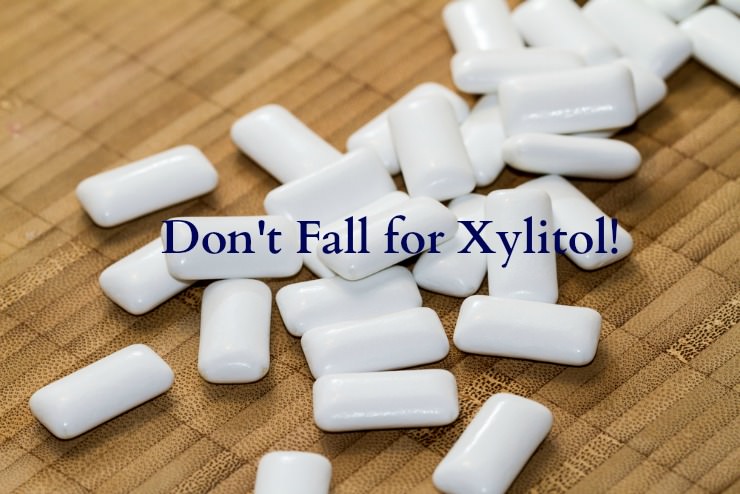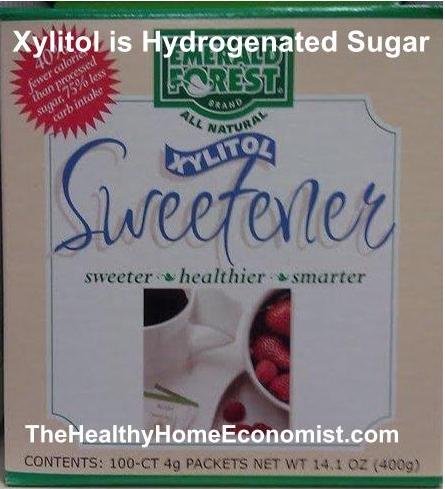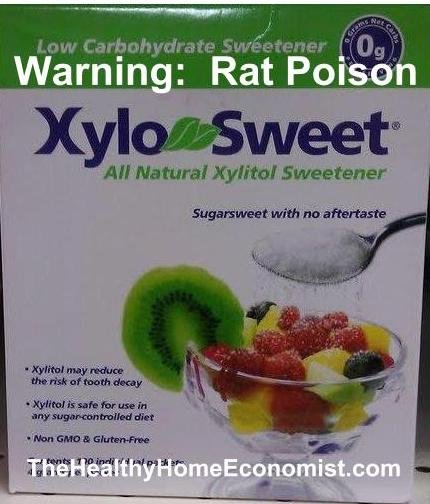
Xylitol is truly the darling of sugar substitutes today. The American Dietetic Association touts its use, with this sugar alcohol sold alone and as a sweetener in a variety of processed foods. Health benefits include a reduced glycemic response compared with sucrose, increased absorption of B vitamins and calcium, and even a reduction in dental caries risk.
Consequently, people with blood sugar issues are flocking to processed foods containing this alternative sweetener as a way to satisfy that sweet tooth without the downside of exacerbating the risk factors for Metabolic Syndrome. This condition is known for the markedly increased likelihood of developing heart disease, stroke, and type 2 diabetes.
Even the healthfood community almost universally considers this sugar alcohol to be a healthy substitute for sugar. A primary reason is that it doesn’t directly contribute toward the growth of intestinal yeasts aka Candida.
Have you noticed that the check out aisles at health food stores are typically loaded with chocolates and other sweets containing at least some xylitol? The truth is that I have yet to talk with any health-conscious person who suggests to me any downside other than the potential for intestinal cramps if you get too much.
Xylitol is Naturally Found in Nature
Xylitol is, after all, a naturally occurring substance. Manufacturers of xylitol market it as derived from xylan. The fibers of many plants contain it, including berries, oats, beets, sugar cane and birch. Sounds pretty harmless at first glance.
The FDA has even granted xylitol GRAS (Generally Recognized As Safe) status. You can’t get any safer than that, right?
 Manufacturing Process
Manufacturing Process
It is true that xylitol is a naturally occurring substance. However, manufactured xylitol is another matter entirely. Food manufacturers produce it using the industrialized process of sugar hydrogenation. In order to hydrogenate anything, a catalyst is needed. In this case, Raney nickel is used which is a powdered nickel-aluminum alloy. (1, 2)
This poses the risk of heavy metal residue and contamination. Nickel, by the way, is a recognized carcinogen and aluminum is associated with the development of dementia. Heavy metals in the body are notoriously difficult to eliminate with frequent use of infrared sauna probably a good idea.
This alternative sweetener doesn’t seem quite so warm and fuzzy anymore, does it?
There is currently no literature on any detrimental health effects of consuming hydrogenated sugar. However, food manufacturers widely used hydrogenated fats for decades before the very damaging effects of cardiovascular health became widely known!
Given the violent industrialized process that is required to produce a hydrogenated sugar like xylitol, it would seem wise to avoid it based on the very poor track record of hydrogenated foods in general.
Most Xylitol Sourced from GMO Corn
While it is true that xylitol can be derived from the xylan of birch trees, xylan is also found in corn cobs. It is much cheaper to use corn instead of birch bark to derive xylitol and so what do you think manufacturers prefer? Corn, of course.
Therefore, unless the label of a xylitol-containing product specifically notes that it is from birch or another nonGMO source, xylitol is very likely from genetically modified corn or possibly GMO sugar beets.
This is the same problem as high fructose corn syrup (HFCS) and white sugar from beets. Food manufacturers rely heavily on these sweeteners in the production of sodas and sports drinks.
You get a dose of GMOs with every sip! More on GMO dangers including sterility and stomach holes at the provided link.
Usage Contributes to Gut Imbalance
The digestive process does not break down sugar alcohols like food. Rather, xylitol arrives intact into the intestines.
At that point, a process called “passive diffusion” takes place. This means that the xylitol draws water into the bowels. Only a partial breakdown is the end result. The unmetabolized portion ferments providing the perfect environment for undesirable bacteria to thrive and grow.
It is true that xylitol itself does not feed candida directly as sugar does. As a result, this artificial sweetener is even promoted as a useful part of the Candida Diet. Unfortunately, the fermentation of undigested xylitol in the gut most definitely can exacerbate yeast problems. Don’t be fooled by this argument!
This is exactly why consuming xylitol can make some folks so gassy and even trigger cramping and diarrhea. Gut pathogens having a heyday in your intestines give off a lot of smelly toxins!
Other Little Known Problems
Xylitol can contribute to acid reflux problems. As a result, those who have issues in this area should avoid it for that reason alone. Chronic acid reflux is a serious problem that can lead to cancer of the esophagus and larynx.
In addition, those who suffer from seizures of any kind should stay away from this alternative sweetener as it can increase the frequency of epileptic attacks.
Two Pieces of Xylitol Gum Can Kill a Rat?
According to unpublished lab tests, approximately 1.65 grams of xylitol kills a 100-gram rat half the time.
Two little pieces of xylitol gum contain about .7 – 1 gram. This is probably enough to meet the definition of rat poison.

Cavity Prevention
Many people are chewing xylitol gum due to compelling scientific evidence for cavity prevention. What about children, however?
Rami Nagel, author of Cure Tooth Decay, doesn’t even recommend xylitol gum for this purpose. His research for any long term safety data turned up the following:
- Epidemiology: No information found
- Teratogenicity: No information found
- Reproductive Effects: No information found
- Mutagenicity: No information found
- Neurotoxicity: No information found
In summary, using this modern substance officially renders you a guinea pig, my friend! It seems that any benefits of cavity prevention are outweighed by the fact that there is no actual safety data backing up its use.
Safe Uses of Xylitol
Given all the problems that consumption of xylitol can trigger, it seems best to bypass the use of this sugar substitute on a regular basis.
Can it ever be helpful? Does it have any benefits whatsoever?
Potentially so. The only time I personally would ever consider using xylitol is to help resolve a childhood ear or sinus infection in order to prevent the use of drug-based antibiotics.
There is evidence that this popular sugar alcohol can indeed help encourage a healthy balance of beneficial bacteria found in the ear canal and sinus cavities. Products like this incorporate xylitol for this purpose.
A therapeutic dose can help resolve infection in these areas quickly with no medication required.
Thus, if you choose to use it, make sure it is sparingly and therapeutically (not as food). Also, make sure it does not come from a GMO source like corn!
References
(1) Xylitol production via catalytic hydrogenation of sugarcane
(2) Catalytic hydrogenation of xylose to xylitol using ruthenium catalyst on NiO modified TiO2 support
(3) Cure Tooth Decay by Rami Nagel
(4) Sugar-Free Blues: Everything You Wanted to Know about Artificial Sweeteners
More Information
Yacon: Healthy Syrup or Healthfood Hype?
Jaggery: India’s Sweet Gift








I’m a Diabetic so my main concern is simply my blood glucose level. Well, I’ve tried this stuff and I don’t get “sweetness” from it. I get “long lasting “bitterness” from it. I just don’t understand people saying it has no unpleasant aftertaste, That’s all I get from it, an unpleasant taste that lingers long after I have consumed it..
James, check out Lakanto; it’s a combination of Lo Han Guo and a fermented sugar alcohol, so not only does it taste wonderful (no bitterness and every bit as sweet as sugar, even in baking), it never bothers my stomach because of the pre-fermentation and being digested completely differently. No GM ingredients, either. Great stuff and worked like a charm in banana bread and my morning iced latte. Hope this helps! The Body Ecology website has a great info page about it, they have been recommending and importing it for ages.
I use Xylitol derived purely from birch tree extract. It contains no GMO corn and other forms of xylan at all.
Of course, I know when I’ve over done it. I get the runs. By now I know not to consume too much of it each day. Personally, the health benefits outweigh any downsides, and for me, the only downsides I’ve ever experienced with this product is a) when I consume too much of it, it has me running to the toilet, and b) it’s darn expensive. 😉
This article got me worried that I’ve been killing off my probiotics so I tried a little experiment. I made yogurt with xylitol…meaning I mixed the xylitol in BEFORE culturing the yogurt. I used filmjolk cultures this time and plan to try every other variety I have at some point. The yogurt cultured perfectly. It will be interesting to see if the culture will perpetuate.
Xylitol is actually a pre biotic.. It’s a soluble fibre that encourages health gut bacteria…
Hi again. Have just scrolled through the 444 comments again and seen there is reference to Stevia. The China product is white…processed. They use bleach to take out the chlorophyll in the pure green leaf???
I think using Stevia leaf daily is fine, but I now, putting mind to the matter, see my daily consumption of the white stuff with those added ingredients is not going to be good for me on daily basis. Maybe worst than a tablespoon of brown sugar a day? (unless cancers cells in me are proliferating in me unbeknown!)
I’ve have been getting very very sick since last May. I’ve had to go to the ER 6 times and I’ve spent about a dozen days admitted in the hospital. I’ve been nauseated every single day. I have to take Carafate and 3 other drugs to keep me for vomiting and dry heaving. Well, I stopped using Ice Breakers yesterday and suddenly, I’m not sick today. I do believe it is because of Xylitol because I’VE QUIT EVERYTHING ELSE. Even not eating on many days to keep for getting sick. My hospital bills have reached in the hundreds of thousands of dollars. I hate that an approved product did this to me. Beware of Xylitol. I have heart problems too and this stuff has almost killed me a few times. I hope this helps someone out there.
Thank you.
Dallas
Hi, I eat xylitol every day since long few years and have no any health problems.
The problem is that some companies sell xylitol produced from genetically modified corn, there are some that sell non-GMO xylitol. It is, therefore, advisable to check thoroughly before investing in GMO derived product.
Xylitol is that it has almost no side effects if used as recommended.
Check this please: “Long-term tolerance of healthy human subjects to high amounts of xylitol and fructose: general and biochemical findings”
ncbi.nlm.nih.gov/pubmed/783060
Regards
You forget that conventional medicine as of today still doesn’t recognize damage to gut flora as a health problem but it is a HUGE issue to long term health. Xylitol damages the gut flora and overall gut environment. Long term use would be very foolish indeed.
Hi, I have not seen anyone commenting about use of Stevia as maybe the best alternative ‘sugar substitute’. I use for sweetening beverages but unfortunately it comes from China, (a country of gross pollution so any foodstuff from there can be contaminated), and it has as 2nd listed ingredient Xylitol, then sodium cyclamate, then saccharin, then sodium salt.
Of course the great thing about Stevia is the punch of sweetness from miniscule quantities, so I imagine all the other ingredients including the Xylitol (also ‘suspect’ or not I wonder?…have not done the research yet) will only be ingested in micro doses also, so not a major threat to health as opposed to tablespoons of sugar or Xylitol in a juice for example
What are your thoughts on this Sarah?
Stevia is fine in moderate amounts. Don’t overdo though as some people have a tendency to do.
It’s harder to find, but you can get the unrefined stevia extract w/o additives. It should be a really dark green liquid. Some herb shops and other online stores will sell the raw organic powdered leaves. I’m not sure how the flavor compares as I have never tried the refined stuff but I don’t like anything else in my tea now that I have acquired a taste for it.
Can you point us to a source for this?
I’ve never heard of anyone getting sick like that from Xylitol. If it was xylitol that made you sick, the only thing I can think of is that you are seriously allergic or intolerant to it. Or like another commenter said you may have been consuming the one derived from GMO corn. I love the stuff but moderation is key for everything right?
I can relate, I have have had symptoms for three years! Migraines, nausea, diarrhoea, terrible anxiety, insomnia and no amount of medication worked. Then I stopped Xylitol and it all clear up!
This is such complete nonsense. Xylitol does not “feed bad bacteria” at all. Xylitol acts against biofilms in your intestine, that is why some people have a violent reaction to it- they have bacterial or fungal overgrowth in their intestines and anything that attacks those will cause a bad reaction.
You’re sadly mistaken. I’ve spent a dozen days in the hospital over the last 8 months because of Xylitol. I’ve been sick every single day until now because I stopped using Ice Breakers (Xylitol).
Good luck.
I’ve been using Xylitol for a good while but I always make sure it’s non GMO from birch trees. But here’s the thing if you are coming off a high sugar diet you need to do it GRADUALLY. It doesn’t matter if you choose good Xylitol. If you go cold turkey on sugar when your body is used to it and switch completely over to Xylitol if will shock your system.
Is Peelu brand gum ok? It says non GMO! Thx & God bless!
I don’t really see the need to ingest the xylitol, if it is only for dental hygiene. You could take a quarter teaspoon into your mouth, swish it around, and spit out the rest. You don’t need a lot. One piece of chewing gum must be just 1 gram or so. I usually bite my chewing gum pieces into halves (more for economical reasons, though), that is enough for keeping a clean mouth after a meal when there is no access to my toothbrush.
The sachets with 4 grams of xylitol for dental hygiene, which somebody mentioned, sounds like an unnecessarily large dosage. And why swallow it you only need it to work in your mouth?
Would you rather rinse your mouth with fluoride or isopropanol, or even triclosan, which many commercial tooth rinse products contain? I wouldn’t. I have tried using vodka, but it makes me feel like an alcoholic, doesn’t taste nice at bedtime.
Xylitol should come with a warning. I bought it unknowingly and started using it with my new diet. I was having horrible cramping and diarrhea on and off. I didn’t link it to the Xylitol at first. I just thought my body was adjusting to my new diet. A week went by that I hadn’t used Xylitol and then I put about about 2 Tbs or 27 grams in a dessert I had made. Within about 30 minutes my ass exploded and did things I didn’t know it was capable of. I was up all night with cramping and diarrhea. You can say whatever you want about people being allergic to fish or peanuts but there is no comparison. Little is known about Xylitol by most people and it is advertised as the best sugar substitute. With so many people having negative side effects there should be a warning.
27g is a LOT, no wonder your ass exploded. It’s a well known side effect of Xylitol that if you consume too much in a day, it’s going to give you the runs and maybe some stomach pain. You’re supposed to go easy on this stuff.